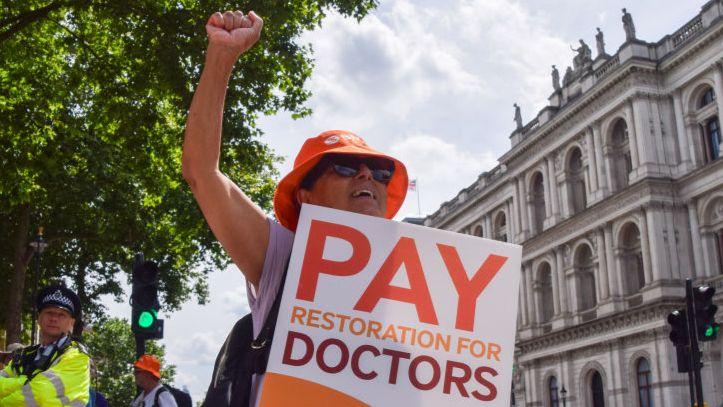Ongoing Negotiations to Prevent NHS Strikes
Talks are set to take place between Health Secretary Wes Streeting and the British Medical Association (BMA) next week in an effort to prevent strike action by resident doctors within England’s National Health Service (NHS). The potential strikes, which have been announced by resident doctors—previously known as junior doctors—are scheduled to begin on 25 July and continue for five consecutive days. These actions are a result of ongoing disputes over pay with the government.
The BMA has made it clear that any strike action will only be canceled if the upcoming talks produce a proposal that can be presented to its members. However, the government has stated that it cannot improve upon its current offer of a 5.4% pay increase for this year. This figure was granted following a 22% increase over the previous two years. Despite this, resident doctors argue that their pay is still approximately 20% lower in real terms compared to 2008. They are demanding a clearer plan from the government to restore the value of their salaries.
Health department sources have indicated that the health secretary is sympathetic to improving working conditions for resident doctors but remains firm on salary matters. In response to the BMA’s announcement of strikes, Streeting criticized the move, calling it “unnecessary and unreasonable.” He emphasized that the NHS is already under significant strain and questioned why the doctors would threaten to worsen the situation. Streeting also stressed that the government is ready to collaborate with the BMA, warning that further strikes could harm patients and delay progress in reducing waiting lists across England.
Dr. Melissa Ryan and Dr. Ross Nieuwoudt, co-chairs of the BMA’s resident doctor committee, expressed that they felt compelled to strike without receiving a “credible offer” to support their efforts to restore pay levels. Meanwhile, Lord Robert Winston, a renowned professor and TV doctor who played a key role in IVF treatment, resigned from the BMA on Friday due to the planned strikes. In an interview with The Times, he urged against the strike action, warning that it could damage public trust in the medical profession.
Resident doctors in England have engaged in 11 separate strike actions during 2023 and 2024. Last year, the incoming Labour government resolved the previous strikes by offering a backdated pay increase of 22% over two years. It is important to note that the planned strikes in England will not affect resident doctors in Scotland, Wales, or Northern Ireland, as those professionals negotiate pay directly with their respective devolved governments.
In England, resident doctors earn basic salaries ranging from £37,000 to £70,000 annually for a 40-hour workweek, depending on experience. Additional payments are provided for working nights and weekends. This does not include the latest 5.4% average pay award, which will be distributed starting in August.
With the upcoming negotiations, the outcome remains uncertain, as both sides face significant challenges in reaching a resolution that satisfies the demands of resident doctors while addressing the constraints of the government. The potential impact on patient care and the broader NHS system continues to weigh heavily on the discussions.







